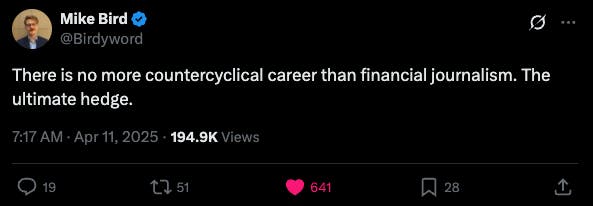| Welcome, Weekenders! In this newsletter: |
| • The Big Read: Patrick Collison's political philosophy could change America |
| • The Top 5: The very best podcasting gear |
| • A look inside the Breakthrough Prize gala |
| • Plus, our Recommendations: An "All-In" alternative; the liberal hoax that fueled deep-state paranoia; and John le Carré meets Agatha Christie |
| |
| Congrats on making it through one of the most volatile weeks in the history of global markets! To be sure, a lot of uncertainty remains regarding what might qualify as a smart, safe, sound investment, but at least two boldface names are betting on an industry that has seen consistent growth through the dot-com bust, the Great Recession and the pandemic: sports. |
| Ryan Smith, co-founder of Qualtrics and owner of the NBA's Utah Jazz and the NHL's Utah Hockey Club, and Accel partner Ryan Sweeney have teamed up to launch Halo Experience Co., a new venture firm. They hope to raise $1 billion for its first fund and spend those dollars on roughly 20 growth-stage technology companies operating within the global sports industry. |
| Sweeney, who joined Accel in 2009 and was an early investor in Smith's Qualtrics, said the market gyrations this week did not faze their vision for Halo. "You never want to root for economic unrest, but the flip side is that opportunity comes with it when you're investing," he told me. "We view this as a big opportunity to go out there and do our jobs well." |
| With Halo, their job involves pouring capital into a constellation of tech startups across digital media, health and wellness, and other industries because "sports interacts with those on a nightly basis," Sweeney said. |
| Smith, who bought the Jazz in 2020 and the Hockey Club last year, has had a front-row seat to the ways in which running professional sports teams increasingly requires both experience in and connection to the tech sector. "I'm blown away with how the worlds are actually growing way closer together," he said. |
| There is precedent for placing new sports investments during times of tumult: Five years ago, the global pandemic ushered in the era of private equity investment in U.S. sports leagues, with the establishment of specific funds like Arctos Partners and Dyal HomeCourt Partners, as well as power players like investment firm Sixth Street, each of which has taken stakes in major league teams including the Golden State Warriors and the Boston Red Sox. Club valuations have skyrocketed, with leagues like the NFL, NBA and MLS signing record-setting broadcast rights deals boosted by tech streamers Amazon, Netflix and Apple. |
| Furthermore, many more states, including New York, legalized sports betting during the pandemic downturn to generate more tax revenues. Those measures have prompted a stronger need for real-time data and broadcasts with minuscule lag time between the action on the court and when it gets displayed onscreen. |
| A similar rationale lies behind both those pandemic-era investments and the present-day founding of Halo: Even in austere times, people will spend money on watching or attending sporting events. |
| "When we talk about sports, we talk about it more broadly as this overall experience economy, of which sports and technology play a major role," Sweeney said. "That economy is massive and ripe for disruption from technology."—Sara Germano |
| |
|
 |
|
| As Stripe has grown enormous in recent years, Patrick Collison, the fintech's 36-year-old billionaire co-founder and CEO, has quietly been at work on another grand-minded task: the proliferation of a new political philosophy—one that's pro-growth, pro-tech and anti-regulation—that he hopes could reshape the U.S. and other developed nations. |
| To spread the idea, he has helped start a series of increasingly influential think tanks and has become a prime figure within a broader network of donors, lawmakers and operatives working to push his agenda. This is the abundance-verse, a realm that envisions a place with more housing, more infrastructure and more cutting-edge medicine. It's just starting to notch some policy wins, and now two high-profile adherents, journalists Ezra Klein and Derek Thompson, have an instant New York Times bestseller on the subject, "Abundance." |
| Collison, who has a real dislike for the spotlight, has tried his best to stay unnoticed as the abundance-verse has come to the forefront. "I would make an extraordinarily poor standard-bearer for any political movement. I'd be like a kid at the front of the parade who scurries off after a pigeon and is never seen again," he said. "I just go where my curiosity takes me." |
|
 |
|
| More and more, it seems like everyone in Silicon Valley is rushing off to begin their own podcast—or appear on someone else's. The medium is decades old but has never seemed to have greater cultural relevance and importance than right now, after podcasters like Spotify's Joe Rogan apparently helped sway last year's presidential election toward Donald Trump. |
| The right equipment can make or break a podcast—or one's appearance on a podcast—and our Paris Martineau has put together a cheat sheet of the best mics, boom arms and, yes, cameras (since pods are no longer strictly audio affairs). Paris approached this research with some considerable personal experience in this world: She co-hosts the weekly AI podcast, "Intelligent Machines," and in her time on the show, she's found that a solid three-point lighting system and a well-positioned DSLR camera are absolute must-haves. |
|
 |
|
| Scientists and starlets can make strange bedfellows. |
| But at this year's Breakthrough Prize ceremony in Santa Monica, Calif., hundreds of scientists, tech leaders and Hollywood stars gathered for a night of celebrating breakthroughs in subjects including gene editing, mathematics and physics. Here's a look inside the gala. |
| Abram Brown, editor of The Information's Weekend section, has found the past week absolutely taxing on his nerves. Reach him at abe@theinformation.com. |
| |
 |
| Listening: "Technology Brothers Podcast Network" |
| Help! The tech bros are everywhere. And by that I mean, clips from the "Technology Brothers Podcast Network" seem omnipresent in my social media feeds these days. |
| The daily tech news show is co-hosted by a pair of—well, yes, bros: John Coogan, a Soylent co-founder, and Jordi Hays, co-founder of Capital, a fintech. They got started on it last fall as a quasi-weekly thing and soon gained enough traction to turn it into a daily affair. Lately, some big-name guests have been showing up to talk about the latest Silicon Valley goings-on: CEOs like Box's Aaron Levie and Flexport's Ryan Petersen, journalists such as Ashlee Vance and Joe Weisenthal, and quite a few members of the contrarian VC set, including Keith Rabois, Shaun Maguire and Trae Stephens. |
| Before setting out, Hays and Coogan did a studious review of the competitive landscape. "Guys talking about a single business for three or four or five hours," Hays said. Rather than follow the usual format, they opted for a chattier, faster pace, modeling their show on "the YouTube reaction streamers who just react to TikToks or gaming content all day," Hays said. (Coogan highlighted another point of inspiration: "Ever listen to 'Car Talk' on NPR?") |
| To a large degree, the show works because Coogan and Hays are comfortable on camera, a reflection of the moment: These days a hit podcast is not just a digitized radio program. It has to exist on video, too, a real change from the past. Another important element to the pod is Coogan and Hays' glib self-awareness. They're not unwilling to acknowledge some of Silicon Valley's absurdities—and that a "tech bro" is a cringe concept. "We're in on the joke," Hays promised. "Early on, we wondered if we should tag ourselves as a comedy podcast."—A.B. |
| Reading: "Ghosts of Iron Mountain" by Phil Tinline |
| In the late '60s, a bunch of leftists led by a young Victor Navasky, who later became editor of "The Nation" and dean of Columbia University's journalism school, decided to pull a fast one on America with "Report From Iron Mountain." The book was total fiction, but it read like honest-to-goodness nonfiction, detailing an elaborate series of plots by the military-industrial complex. Among other schemes, it purported to reveal a plan to enact a "permanent war economy" that would turn armed conflict into the "basic social system" of the U.S. The plotters were supposedly real-life Dr. Strangeloves, conspiring together from a series of bunkers in the Hudson Valley. |
| The people behind "Report From Iron Mountain" fessed up to their hoax a few years after it came out, but then a funny thing happened: A not unsizable part of the population refused to believe it was a hoax. "Ghosts of Iron Mountain" ably chronicles the entire saga and follows it into the present day, where fear of the deep state lives on. Those paranoids believe "the first version of a story is always true and that a follow-up is always a cover-up," writes Phil Tinline, a British journalist. (I suppose it takes a foreigner to cast such a twinkling eye over our country's propensity for hysteria.) "The basic principle here is that 'nothing is accidental.' No one ever makes, and then corrects, a mistake. No one ever plays a prank, then reveals it."—A.B. |
| Watching: "Black Bag" |
| Director Steven Soderbergh delights in efficient mastery these days, so let me try to do the same here: "Black Bag," Soderbergh's excellent 93-minute spy caper is John le Carré crossed with Agatha Christie, with Michael Fassbender and Cate Blanchett as a pair of married spies. Fassbender's George Woodhouse is a human lie detector; Blanchett's Kathryn St. Jean is a veteran field operative implicated as a possible mole. Is she? Well, Fassbender sets out to find out, often discovering Pierce Brosnan, Tom Burke (the love interest from "Furiosa: A Mad Max Saga") and Regé-Jean Page (the hot duke from "Bridgerton") hiding in a dim corner. The art of spycraft itself is a major supporting character, and the film's plot involves the loss of a cyberweapon, Severus, which might lead to a coup in Moscow. Will it? Well, it does give George an excuse to throw another dinner party.—A.B. |
| |
|
| Couldn't agree more. |
 |

0 comentários:
Postar um comentário